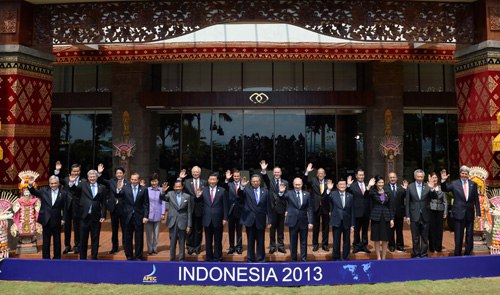|
 |
|
ASIA-PACIFIC COOPERATION: Chinese President Xi Jinping (fifth left, front row) poses with other leaders at the APEC Economic Leaders' Meeting in Bali, Indonesia, on October 8, 2013 (MA ZHANCHENG) |
Level-headed
Foreign observers often use "assertive diplomacy" to describe China's diplomacy under the new leadership. But this is not the true description of China's evolving foreign policy.
China's attitude toward international hotspot issues in 2013 directly reflects the new leadership's preference for peace. China firmly takes the side of peace, and opposes military solutions. It endeavors to persuade concerned parties to hold peaceful talks, provides coordination as a responsible power, actively comes up with "China solution," and plays an important role in maintaining the direction of a political settlement of Korean Peninsula situation, the Syria issue and Iran's nuclear issue. China's fair and clear stand on these disputes has prevented the situations from further deteriorating.
In December 2013, North Korea announced that senior leader Jang Sung Taek, who was married to top leader Kim Jong Un's aunt, was removed from all his posts and executed for "anti-party and counter-revolutionary crimes." China's official reaction was brief, cool-headed and low-key, showing the world that it does not intend to draw any conclusions on the domestic situation in North Korea, but that it will not miss any opportunity to persuade Pyongyang to join the road of self-reform and return to the six-party talks on its nuclear issue.
Boosting development
What the new Chinese leadership really wants is to push forward domestic reform smoothly. In keeping with this, China's diplomacy is targeted at expanding opening up and promoting cooperation.
Since the leadership change in March 2013, China has been making preparations to explore a new way to boost the opening up and deepen reform. Premier Li delivered his most important speech after becoming the head of government at the Summer Davos Forum in Dalian, a coastal city in northeast China's Liaoning Province, on
September 11, 2013. Li said in his speech that China's development must depend on reform as well as opening up. China's economic transformation would make greater contributions to the world's development and prosperity, he said, adding that China is willing to share this huge opportunity with the world, hoping other countries will provide a better cooperative environment for China's development.
Approving the decision of comprehensively deepening reform, the Third Plenary Session of the 18th CPC Central Committee stressed that reform of the economic structure should be a key element of the following new phase of development. The session emphasized that China should adapt to the new situation of economic globalization, promote reform through expanding opening up, and form a new pattern of opening up on all fronts.
China is hastening its pace in advancing new international trade frameworks to develop a free trade area network. It has signed 12 free trade agreements and is negotiating another six, involving a total of 31 countries and regions. In the second half of 2013, China restarted its bilateral investment agreement negotiations with the United States based on the precondition of national treatment and came up with strategic blueprints for setting up the Silk Road Economic Belt and the Maritime Silk Road of the 21st Century. It also accelerated construction of connectivity of infrastructure facilities with its neighbors.
At the same time, China's attitude toward U.S.-led Trans-Pacific Partnership (TPP) trade negotiations has changed a little. While driving Regional Comprehensive Economic Partnership negotiations with ASEAN, China declared that it would discuss communication and interaction with regional cooperative mechanisms like the TPP, so as to fasten the two wheels of regional and global trade arrangements together.
The author is an op-ed contributor to Beijing Review
Email us at: yanwei@bjreview.com | 